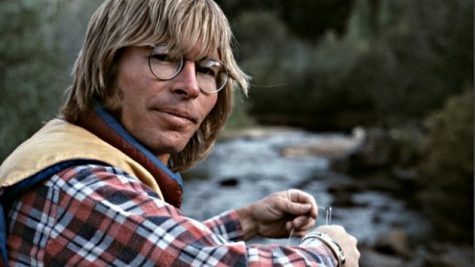Earth Day blues
Playlist of the week 4/23/21
April 23, 2021
Earth Day is this week. In honor of the giant sphere still spinning despite centuries of human abuse, I‘ve gathered some songs that talk about the beauty of the Earth and the problems it faces. The alarming rise of global temperatures and carbon emissions needs to be addressed for future generations, but this week’s hits remind us that the world isn’t going anywhere, and it’ll be here long after we’re gone.
“The Earth Keeps Turning On” – Mr. Smolin

Barry Smolin is best known for the music he produced on the TV show “Weeds,” which features this song in its third season. The song offers a hopeful look at the future of the planet, sung in a way reminiscent of a children’s song. He croons about the seasons of the year––when one season begins to last too long, a long-waited change commences, like every other year prior. He goes on to sing about how there’s always night and day, and when night begins to last too long, the next day is always about to begin. The people that inhabit the Earth make noise, but then the noise is gone, and the silence lasts too long. Again, you may think something has gone wrong. However, the noise always resumes and life goes on. It’s a simple and comforting tune that offers a lot of basic and somewhat obvious platitudes about the passing of time. The song makes me feel hopeful that no one reading, or their children, will be alive when the Earth stops spinning (if that can even happen? I don’t know, I’m only a STEM major).
“(Nothing But) Flowers” – The Talking Heads

Off their final 1988 album, “Naked,” the Talking Heads bring out one good song on an otherwise mostly bleak album. David Byrne offers his signature sarcasm and sardonic wit, ironically suggesting that he wants business and buildings to take over the natural landscape of previous America. If you have the chance, check out the music video––the band includes fun facts that make me question if I even ever wanted the Earth to exist. Byrne presents humorous lines such as, “From the age of the dinosaurs, cars have run on gasoline,” and “I dream of cherry pies, candy bars and chocolate chip cookies.” Silly Byrne, cars were invented roughly 65 million years after the last dinosaur went extinct, didn’t you know? The song recalls a time period after corporations had taken over so much land that nature was beginning to return. Buildings were torn down for fields and fast food is replaced with nuts and berries. With this, The Talking Heads offer a commentary critique on social life––as many of their songs do––with the last line “Don’t leave me standing here, I can’t get used to this lifestyle.” Using this final quip, Byrne explores the sense of dependence that humans have acquired after living with such posh, modern accessories
“Last Great American Whale” – Lou Reed

Years after The Velvet Underground broke up, Lou Reed had already released several successful solo albums. Coming off his 1989 album, “New York” the American poet and lyricist released “Last Great American Whale,” which mocks modern civilization by comparing the ways of living between European Americans and Native Americans. The story starts off with a bigoted white man getting a hatchet in his head after upsetting a Native American (yes, this may be a dated scene, but its powerful nonetheless), and ends with the selfishness of man seeking revenge. After the chief has the man killed, a great storm forms, and a National Rifle Association (NRA) member kills the last great American whale after trying to shoot a harpoon at the chief in retaliation. The last few stanzas seem to be separate from the rest of the song, as the previous story has already concluded. Now, Reed offers more vivid imagery of how “human life is not worth more than infected yeast” and how “Americans don’t care too much for beauty.” A lyricist in the ranks of Bob Dylan, Neil Young and Joni Mitchell, Reed rarely lets down his audience, and his storytelling craftsmanship enables everyone to hear about issues in a way they might not want to listen to.
“Rocky Mountain High” – John Denver

“Apeman” – The Kinks

I discovered this song while figuring out songs to add to this article, and I’m glad I did. Filled with fun piano segues that lead into an acerbic chorus, the song discusses the sophistication that man feels when among other animals and vegetation, including birds, flowers and trees. Though man attempts to enrich his life by following a vegetarian diet and building cities, he still follows corrupt politicians and breathes in polluted air. In this way, we are no better than other animals, because at least they don’t have any pretenses about being superior while encouraging the extinction of 150 different species every day. Ignorance is bliss, especially when faced with the existential dread of a dying planet. Taking up a titular “Apeman” role would make you blissfully unaware of your problems, but it doesn’t actually make any of them go away. As stated in the song, “I don’t want to die in a nuclear war.” Despite the great advancements made in human civilization, we still find ourselves surrounded by problems that we have created ourselves.

